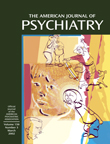Meta-Analysis and Psychiatric Genetics
To the Editor: In the article by Stephen V. Faraone, Ph.D., et al. (1), I find the use of meta-analysis to substantiate their claim perplexing. Meta-analysis may be a useful tool when examining studies with reasonably similar results, but using meta-analysis “to reconcile conflicting findings” (p. 1052) is a dubious endeavor. A significant majority of the studies in their meta-analysis either do not substantiate or contradict the claim that the 7-repeat allele of the dopamine D4 receptor gene is seen in higher prevalence in individuals with attention deficit hyperactivity disorder (ADHD). I certainly agree that the authors’ conclusion is “counterintuitive” (p. 1055). Notwithstanding that, I have a few criticisms of the meta-analysis itself.
1. While the authors ruled out the possibility that the results of an initial study (2) were false positive, using that same study in the meta-analysis along with attempts to replicate it is “stacking the deck.” The prevalence of refuted initial false positives from molecular genetics studies of mental illnesses approaches 100% (3). Thus, this initial study should not be included in the meta-analysis (even if it is the most strongly positive study).
2. Despite the impressive mathematical demonstration of nonbias, I suggest there are a few potential areas of bias. First, Dr. Faraone included one of his own studies in the meta-analysis. Second, I can hardly imagine more biased groups to cull data from than “colleagues presenting such data at national meetings” and “the molecular genetics e-mail network” (1, p. 1053). Also, the authors stated, “Unfortunately, neither type of study has consistently confirmed the putative association between ADHD and the DRD4 7-repeat allele” (p. 1052). Unfortunate for whom?
3. Even if “it is reasonable to attribute differences among studies to chance fluctuations” (p. 1055), this does not account for the possibility that the studies regarding the D4 receptor gene 7-repeat allele simply provided the most false positives in comparison with molecular genetic studies of ADHD as a whole. A controlled meta-analysis of all molecular genetic studies for ADHD would be interesting; a null hypothesis should first assume that no such genes exist and that all significant findings to date, both positive and negative, are the result of “chance fluctuations.”
4. The argument that ADHD is “mediated by many genes acting in concert” (p. 1052) is rather circular in that it is based primarily on the complete failure of molecular genetic studies to find such genes and replicate those findings. Whether or not ADHD genes truly exist (individually or acting in concert) remains an unproven assumption.
To claim that there is a link between ADHD and the D4 receptor gene 7-repeat allele “or some nearby gene” (p. 1052), a consistent replicable protocol must first be developed. A “small” association noted in a meta-analysis of conflicting studies does not meet the burden of proof.
1. Faraone SV, Doyle AE, Mick E, Biederman J: Meta-analysis of the association between the 7-repeat allele of the dopamine D4 receptor gene and attention deficit hyperactivity disorder. Am J Psychiatry 2001; 158:1052-1057Link, Google Scholar
2. LaHoste GJ: Genetics of complex behavioral traits: obesity, dopamine, and mood. Mol Psychiatry 1996; 1:302Medline, Google Scholar
3. Faraone SV, Tsuang MT, Tsuang DW: Genetics of Mental Disorders. New York, Guilford, 1999Google Scholar



